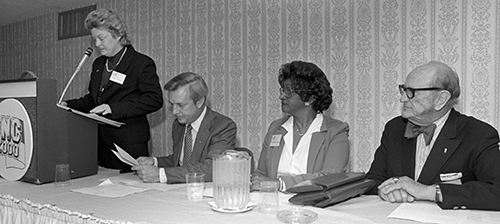 The Commission on the Future of North Carolina, also called NC 2000, was created in June 1981 by Governor James B. Hunt Jr. Chaired by William C. Friday, then president of the consolidated University of North Carolina System, with Elizabeth D. Koontz of Salisbury as vice chair, the commission embarked on a long-range planning process, with extensive assistance from professionals and broad-based public participation that reached into each of the state's 100 counties. NC 2000 sought to determine where North Carolina stood in a variety of categories, describe where it was headed, and set goals for the state on its entry into the twenty-first century and recommend ways to meet these goals. The commission's report, transmitted to the governor in March 1983, contained 44 goals and 107 recommendations concerning the state's citizenry, economy, natural resources, and community.
The Commission on the Future of North Carolina, also called NC 2000, was created in June 1981 by Governor James B. Hunt Jr. Chaired by William C. Friday, then president of the consolidated University of North Carolina System, with Elizabeth D. Koontz of Salisbury as vice chair, the commission embarked on a long-range planning process, with extensive assistance from professionals and broad-based public participation that reached into each of the state's 100 counties. NC 2000 sought to determine where North Carolina stood in a variety of categories, describe where it was headed, and set goals for the state on its entry into the twenty-first century and recommend ways to meet these goals. The commission's report, transmitted to the governor in March 1983, contained 44 goals and 107 recommendations concerning the state's citizenry, economy, natural resources, and community.
Reaction to the commission's report was mixed and its usefulness debated. The General Assembly's initial response was a bland joint resolution encouraging continuation of the NC 2000 process. The 1983 legislature produced nothing of real substance in reaction to the report, although some of the recommendations were later implemented. Interstate 40 was completed, and the state was successful in stimulating economic growth, especially in the Charlotte, Triad, and Research Triangle Park areas. In 1997 the General Assembly appointed a 23-member Commission on the Future of Electric Service in North Carolina-another step recommended by NC 2000.